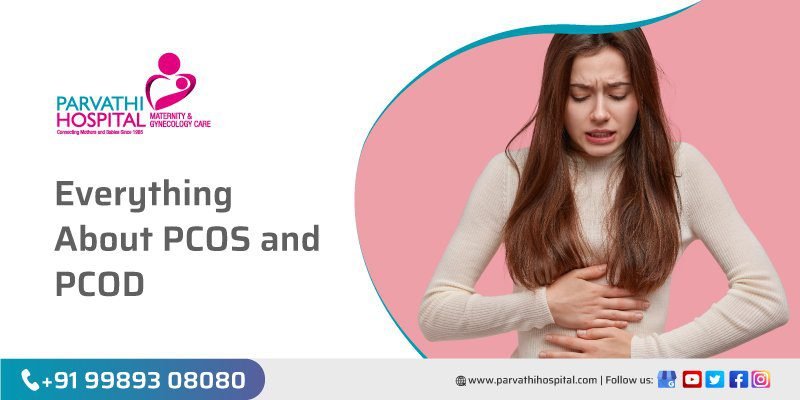Subtotal $0.00
PCOS and PCOD: Differences, Causes, Symptoms, and Treatment
PCOS or PCOD is a syndrome that affects women’s ovaries, which are reproductive organs that generate progesterone and estrogen hormones that help maintain the menstrual cycle, as well as minor amounts of hormones like inhibin, relaxin, and androgens. PCOD affects nearly ten percent of all women on the planet. Those with PCOS create more male hormones than women without the condition. This hormonal imbalance causes people to miss menstrual periods, making it difficult for them to conceive. If you want a checkup for PCOS and PCOD, contact Parvathi Hospital. They are the best gynecology hospital in Hyderabad.
Difference Between PCOS and PCOD
Is PCOS and PCOD the same? Some women can be unsure of the similarities or differences between PCOS and PCOD. Both medical diseases share the same symptoms and are linked to ovaries and hormonal imbalances in fertile women aged between 12 and 51. The following are the differences between PCOD and PCOS that every female should know:
Here are some of the must-known points about polycystic ovary syndrome (PCOS):
- A major health issue that might result in infertility
- A metabolic condition that can lead to anovulation.
- PCOS can increase the risk of miscarriage and other issues such as early birth and makes getting pregnant extremely unlikely.
- It may also result in further issues like type 2 diabetes and endometrial cancer.
- could result in PCOS acne
- And here are some of the critical facts about polycystic ovarian disease (PCOD):
- It is a lot more common than PCOS.
- Ovaries generate immature or semi-mature eggs as a result of this condition.
- It commonly occurs due to obesity, hormone imbalance, stress, and an unhealthy lifestyle in general.
- It usually has no impact on a woman’s fertility, but she can experience difficulties getting pregnant (medication may be needed)
- It generally has no other serious complications
Causes of PCOS and PCOD
There are many reasons why PCOS or PCOD may happen in a woman’s body.

Here are some of the most common causes of PCOS and PCOD:
- Excess insulin levels in the body might increase androgen production (a male hormone) that causes difficulty with ovulation
- Excess androgen hormones produced by the ovaries can lead to acne and hirsutism (hair growth on both face and body)
- Low-grade inflammation can result in an increase in testosterone production and problems with the heart or blood vessels.
- Genetics correlation is also shown in women with PCOS
Symptoms of PCOS and PCOD
Some women realize they have symptoms around the time they get their first period, while others don’t until they’ve put on a lot of weight or are having difficulties getting pregnant. Women need to know precisely how to check PCOS and PCOD symptoms. The following are the most typical symptoms of PCOS and PCOD in females:
- Acne (Face, chest, and upper back)
- Excessive Hair growth (Face, back, belly, and chest)
- Heavy menstrual bleeding (Menorrhagia)
- Hair loss (Thinner hair and hair fall)
- Irregular menstruation (Oligomenorrhea)
- Skipped or absence of menstruation (Amenorrhea)
- Skin darkening (Neck, groin, and breasts)
- Weight gain
Treatment for PCOS and PCOD
You might be feeling anxiety, fear, or even depression if you recently received a PCOS or PCOD diagnosis.

Fortunately, numerous treatments are available, but they could take time and effort. Some of the best treatment options are listed below:
- Ovulation causing medication
- Diabetes medication
- Following a PCOS diet and making other lifestyle changes
- Birth control pills
Patients have some options for PCOS treatment, as you can see. Your doctor might suggest a single approach or a few others in combination. It’s important to stress that ovulation-inducing drugs carry potential hazards when used as a treatment. For instance, it can increase the patient’s odds of having several children (twins). Additionally, these drugs may cause ovarian hyperstimulation, a condition in which the ovaries overproduce hormones. Pelvic pain and stomach bloating can be experienced by women who have ovarian hyperstimulation.
PCOS and PCOD Treatment at Parvathi Hospital
Modern facilities provide thorough diagnosis and treatment with skilled gynecologists. Parvathi Hospital is one of the top facilities for treating PCOS/PCOD issues. Parvathi Hospital uses advanced infertility treatment procedures. The doctor will recommend you to a skilled endocrinologist for the long-term management of PCOS symptoms. There are also lifestyle and diet management counselors on staff at the hospital


Comments are closed